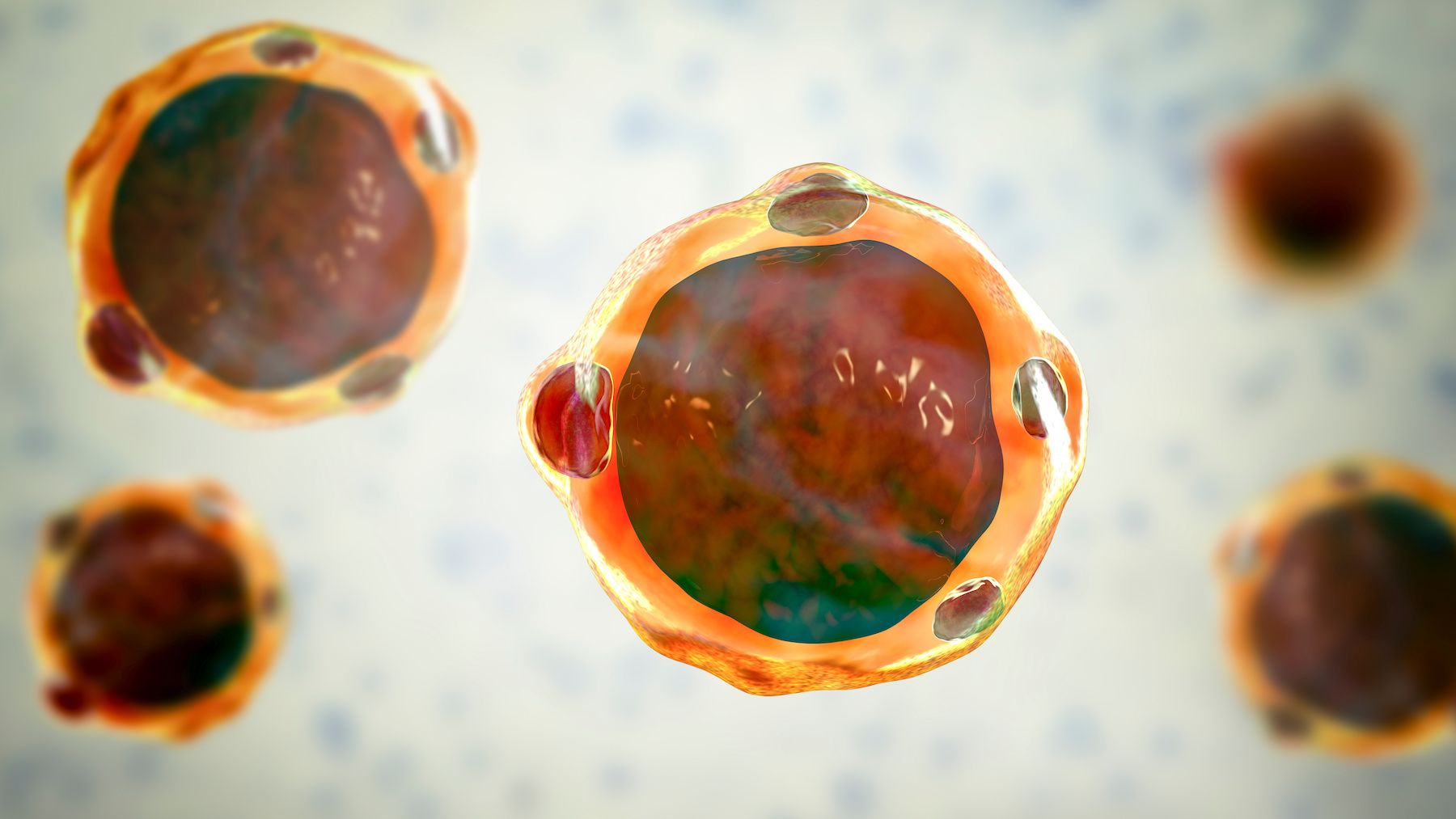

Experiencing frustrating gastrointestinal symptoms like abdominal pain, cramping, and nausea with no explanation? There’s a chance you might be suffering from something called blastocystis hominis. But before we learn more about this protozoan that may be in your digestive tract, let’s talk about the gut and why experiencing unwanted gastrointestinal symptoms chronically can wreak havoc on your overall health.
The Importance of the Gut
The gut is home to trillions of bacteria – more even than the number of human cells in the body! These bacteria and microbes help make up what’s known as the gut microbiome.
The gut microbiome functions essentially as an organ and plays a role in many body processes, but especially the immune system. So much so that 70-80% of the immune system is located in the gut! The gut also helps us digest and absorb nutrients, support metabolism, and even helps produce and metabolize hormones and neurotransmitters like serotonin and dopamine for example.
The microbiome can contain both good microbes and bad microbiomes. We want more of the good guys because they help lower inflammation and support a healthy body system, leading to less chronic conditions. One study even found that those with healthy aging had less pathogens in the gut microbiome.
Because the microbiome plays such an important role in health, it makes sense that disruptions to it could be devastating – especially when those disruptions are chronic, such as an undiagnosed parasitic infection.
What is Blastocystis Hominis?
Blastocystis hominis is a microscopic, single-celled organism called a protozoan found in the gastrointestinal tract. It lives off the host in the digestive system and can cause a host of unwanted symptoms.
Under normal circumstances, harmless protozoans can live in the digestive tract – some can even be helpful. But others can cause disease. While some people who have blastocystis hominis in their digestive system have no symptoms, it can also wreak havoc and unwanted symptoms in many others.
How do you get Blastocystis Hominis?
Exposure to blastocystis hominis occurs fecal-orally, a route of transmission where the pathogen is transmitted in fecal particles from one person to the mouth of another person. This is primarily caused by lack of hygiene practices after using the bathroom, or contaminated food or water. So, for example, this would occur if you or someone you’re in close contact with doesn’t wash their hands after using the bathroom – especially after a bowel movement.
Blastocystis Hominis Symptoms
Blastocystis hominis symptoms can include:
- Diarrhea
- Abdominal pain
- Cramping
- Nausea
- Bloating
- Excessive gas
- Fatigue
- And even constipation for some!
How To Test for Blastocystis Hominis
To test for blastocystis hominis, a comprehensive stool analysis is performed. Once the sample is collected, blastocystis hominis is usually diagnosed through identification of the parasitic cells through microscopic examination and PCR testing.
If you are struggling with frustrating gastrointestinal symptoms with no obvious explanation, maybe it’s time to meet with a functional medicine provider to get to the bottom of your symptoms. At Arizona Wellness Medicine, we get to the root cause of your symptoms by taking a comprehensive history, looking at your unique symptoms, completing a physical exam, then obtaining any needed lab work or testing. If you’re concerned blastocystis hominis might be the cause of your symptoms, then a comprehensive stool analysis would be recommended. Learn how functional medicine can help here.
Blastocystis Hominis Treatment
Antiprotozoal Treatment
Traditionally, treatment consists of a course of an antiprotozoal medication like metronidazole. Metronidazole is often used first when treating blastocystis hominis, but sometimes side effects can include anorexia, nausea, vomiting, and a metallic taste, causing some to look for other treatment options. There are also other antiprotozoal medications options as well, like nitazoxanide.
Silver Nanoparticles
One alternative natural treatment option to the traditional dose of metronidazole are silver nanoparticles, which are effective in the treatment of many parasitic diseases. While it’s not completely understood how they work, it’s believed they inhibit parasitic growth by enhancing the host’s immune system functioning and can cause cellular stress in the microbes. They also impair the surface structures on the parasites, which is the area responsible for infection.
Herbal Antimicrobials for Blastocystis Hominis
Some herbs have shown to be beneficial to the gastrointestinal tract, especially in targeting the blastocystis hominis parasite including:
- Oregano, which has antimicrobial properties to help target the parasite. In addition, oregano also reduces inflammation and helps improve gut health.
- Garlic, which also has antimicrobial properties, helps reduce inflammation.
- Wormwood, which has been used throughout history to treat parasites. This herb reduces inflammation, fights oxidative stress, and can help improve digestion.
- Berberine (found in Goldenseal), Grape Seed Extract, Grapefruit Seed Extract, Black Walnut, Olive Leaf Extract, and Artemisinin are all other examples of herbals used to help get rid of blastocystis and other unwanted gut microbes.
- Clinically we often use herbal antimicrobial combinations supplements that work synergistically.
Diet and Probiotics
Some clinical studies have shown improvement in gastrointestinal symptoms from a blastocystis hominis infection with a lactose-free and high-fiber diet. While studies haven’t looked exclusively at the effect of diet on blastocystis hominis, eating an anti-inflammatory diet – and the benefits this has on the digestive system in general – is a good way to go.
Other diet changes include:
- Drinking more fluids
- Adding in a high-quality probiotic, which can help strengthen the gut and reduce gastrointestinal symptoms.
- Avoiding raw or undercooked food
While treatment is often recommended for longer lasting symptoms, sometimes it may be self-limiting so intervention is not required. This is something to talk with your functional medicine provider about to find the best option for you.
Blastocystis Hominis and Ulcerative Colitis
Interestingly, blastocystis hominis also has a possible role in activating certain autoimmune diseases like ulcerative colitis, an inflammatory bowel disease causing inflammation and ulcers in the digestive tract. Case studies have shown that the presence of blastocystis hominis may complicate ulcerative colitis.
In one study, researchers found that after several patients received metronidazole therapy, it seemed to have the possibility of benefiting ulcerative colitis patients as well, helping to reduce the need for major surgery. Because of this, researchers have suggested the importance of a comprehensive stool analysis for ulcerative colitis patients, looking specifically for organisms like blastocystis hominis that may be contributing to symptoms without any other cause.
How To Prevent Blastocystis Infection
The best way to prevent blastocystis hominis infection is through good personal hygiene practices. Make sure to:
- Wash fruits and vegetables before eating
- Avoid contaminated food or water
- Don’t share personal hygiene supplies with others like toothbrushes and towels
- Wash hands frequently with soap and water, especially after using the restroom
- Keep cooking surfaces clean
Frustrating Gastrointestinal Symptoms Got You Down?
Struggling with gastrointestinal symptoms like nausea, abdominal pain, cramping, and diarrhea with no end in sight? You don’t have to suffer.
At Arizona Wellness Medicine, we take pride in looking at your whole health picture – from your symptoms, to your health history, your habits, your diet, and beyond. We recognize that health is multi-functional and symptoms provide a window into what’s going on in the body. That’s why we treat everyone as an individual and get to the root of their symptoms – whether it’s gastrointestinal symptoms from blastocystis hominis or cold symptoms that linger too long. Learn more about how our highly trained functional medicine providers can help you here.
Resources:
- Blastocystis hominis Revisited
- In vitro Effect of Silver Nanoparticles on Blastocystis hominis
- The role of Blastocystis hominis in the activation of ulcerative colitis
- Blastocystis species
- Blastocystis hominis complicating ulcerative colitis
- Modulating the Gut Micro-Environment in the Treatment of Intestinal Parasites
Share:
Dr. Emily Parke
Social Media
Most Popular Posts
Subscribe To Our Newsletter
Related Posts

How Fructose Intake Affects Metabolic Health: What You Need to Know
Fructose, found naturally in fruits and added to processed foods as high fructose corn syrup, impacts health. Learn the metabolic effects of fructose intake.

Get More Vitamin D for Better Health!
Of all the vitamins and minerals you should be sure you’re getting enough of, vitamin D is perhaps one of the most important. The benefits of vitamin D are widespread and pretty incredible.

The Science Behind Protein: The Optimal Amount of Protein in the Diet Based on Age and Activity Level
Different amounts of protein are needed at different stages of life. Learn about protein, how much you need, and what happens when you don’t get enough.

Magnesium: The Essential Mineral, Its Role in the Body, and What to Know About Magnesium Supplements
Learn about the mineral magnesium, its role in the body, how to spot magnesium deficiency, and the most bioavailable forms of magnesium to supplement with.
